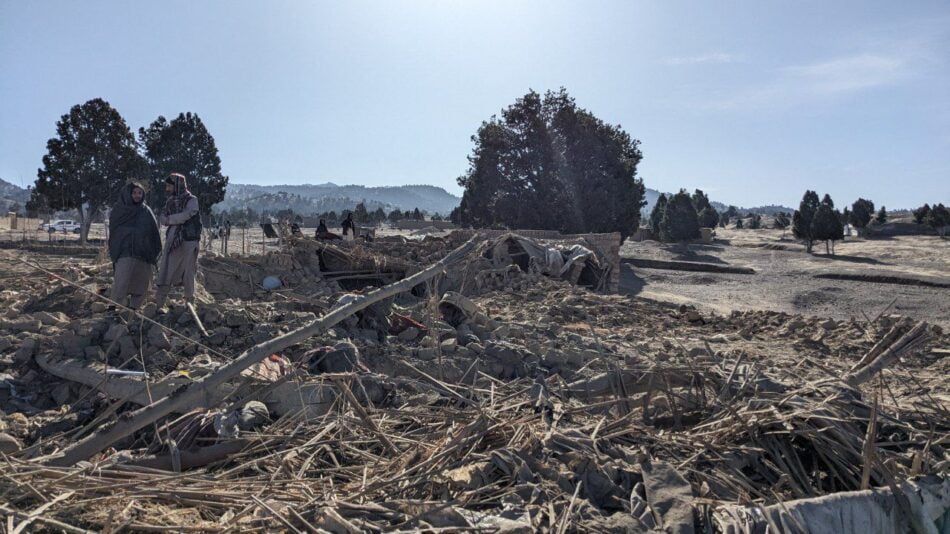Zabihullah Mujahid, the spokesman of the Afghan government led by the Taliban, says, “The TTP is not in our pocket. The TTP is a 20-year-old group in Pakistan that emerged as a result of the faulty policies of the Pakistani military leaders.”
Mujahid made these comments in a BBC-Pashto interview following Pakistan’s airstrikes in Paktika and Khost provinces in Afghanistan and violent clashes between border guards along the Durand Line.
“We cannot control the TTP or dictate their actions. We have facilitated negotiations between the TTP and Pakistan on several occasions, but they [the Pakistan government] have undermined those talks. The breakdown of negotiations is not our responsibility,” he added.
Pakistan’s Airstrike Rationale
Earlier, Pakistan’s Ministry of Foreign Affairs released a statement claiming the airstrikes targeted terrorists associated with Hafiz Gul Bahadur, a TTP leader in Afghanistan, and were based on intelligence information.
“Over the past two years, Pakistan has repeatedly conveyed its serious concerns to the Interim Afghan Government over the presence of terrorist outfits including TTP inside Afghanistan. These terrorists pose a serious threat to Pakistan’s security and have consistently used Afghan territory to launch terrorist attacks inside Pakistani territory,” the press release emphasized.
The Ministry of Foreign Affairs continued, “Pakistan places the highest importance on Afghanistan’s sovereignty and territorial integrity. We have always prioritized dialogue and cooperation to address the terrorist threat. We have repeatedly urged Afghan authorities to take concrete action to prevent Afghan soil from being used as a staging ground for terrorism against Pakistan. We have also called on them to deny safe havens to TTP and to hand over its leadership to Pakistan.”
Allegations of Presence in Afghanistan
The day before, Pakistan’s special representative for Afghanistan, Asif Durrani, made similar accusations, claiming that approximately five to six thousand TTP members are hiding in Afghanistan. He said the current Afghan government has ignored requests to engage these TTP members in talks with Pakistan or hand them over.
Taliban: TTP is Pakistan’s Internal Issue
However, Taliban-led Afghan government officials dismiss the TTP as an internal Pakistani issue. Zabihullah Mujahid told BBC Pashto, “They are transmitting false information. The Pakistani authorities, frustrated with controlling attacks within their own territory, are seeking to divert their people’s attention.”
He also questioned Pakistan’s methods: “It’s strange that they can identify and count their enemies here in Afghanistan, yet fail to do so when they attack Pakistani military bases or within Pakistani cities. Why can’t a car full of explosives go unnoticed within their own borders?”
Casualties on both sides
According to Mujahid, Pakistani airstrikes on two houses in Paktika and Khost provinces killed at least six women and three children. Condemning the attacks as cruel, he said the Afghan Ministry of Defense ordered border forces to retaliate against Pakistani military facilities. While Mujahid did not confirm Pakistani casualties, Pakistani media reports indicate the death of an army captain along with injuries to two soldiers in Parachinar.
Mujahid believes the Taliban’s response was sufficient and emphasized that they do not want war with the Pakistani people. He blames a few Pakistani military generals for escalating tensions.
Formal Protest and Social Media Backlash
The Afghan Ministry of Foreign Affairs issued a formal statement regarding the attacks. They declared that the Pakistani military’s actions in Paktika and Khost provinces, which caused the deaths of women and children, led to the Head of the Pakistani Embassy in Kabul being summoned and formally presented with a letter of protest.
The press release, issued by the Taliban’s Ministry of Foreign Affairs, strongly condemns the attacks, while asserting Afghanistan’s historical resolve to defend its sovereignty against powerful adversaries. It further emphasizes the potential for “irresponsible actions” and “misguided policies” by unknown elements within Pakistan to harm the relationship between the two Muslim nations.
Widespread condemnation of Pakistan’s airstrikes has flooded Afghan social media, with even some Taliban opponents finding the actions unacceptable. Responses have been mixed, with some praising the Taliban’s retaliatory measures and others criticizing a perceived weak response.
Former Afghan President Hamid Karzai condemned the airstrikes as a violation of territorial integrity and called for Pakistan to change its policies and establish “civilized relations” with Afghanistan based on good neighborliness.
Pashtun singer Sardari Ali Takar warned on his X account that “Pakistan is touching a bee’s nest.”
Naseer Ahmed Faiq, Chargé d’Affaires of the Afghan Permanent Mission to the United Nations, called the attacks flagrant violations of international law” and “unacceptable”.
Afghan journalist Bilal Sarwari noted that the Taliban won’t be bullied and are gearing up for a fight against the Pakistani military.
An account attributed to former Afghan military general Murad Ali Murad wrote: “Our differences with the Taliban are in their place, but we appreciate their decisive stance against the foreign enemy, especially Pakistan.
Videos circulating on social media show Taliban forces moving in groups towards the Durand Line.
A Precarious Situation
Afghan experts see a parallel between Pakistan’s current position and that of the former Afghan government, which demanded Pakistan cease support for the Afghan Taliban. Some believe the TTP is a consequence of Pakistani tactics to support the Afghan Taliban.





